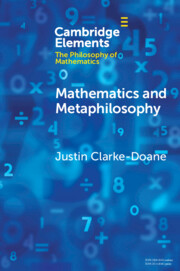Element contents
Mathematics and Metaphilosophy
Published online by Cambridge University Press: 06 June 2022
Summary
- Type
- Element
- Information
- Online ISBN: 9781108993937Publisher: Cambridge University PressPrint publication: 30 June 2022
References
- 21
- Cited by

